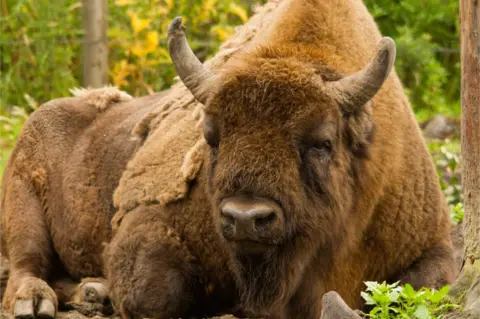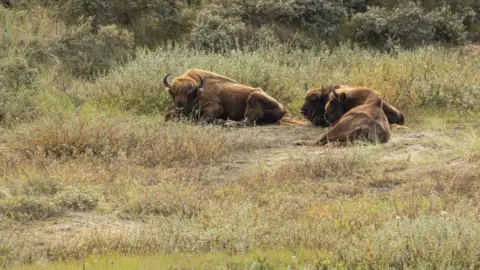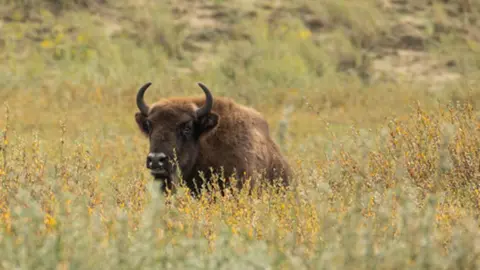European bison rangers chosen for Kent woodland herd
 Tom Cawdron
Tom CawdronThe UK's first ever bison rangers have been selected to help introduce the animals to the country.
A herd of four European bison will live in Blean Woods near Canterbury, Kent, as part of a £1.5m project, led by Kent Wildlife Trust and the Wildwood Trust.
The breed is the closest living relative to ancient steppe bison, which once roamed Britain.
Tom Gibbs and Donovan Wright are starting work ahead of the bison arriving into the area in 2022.
Mr Gibbs, who previously worked as conservation officer for Herts and Middlesex Wildlife Trust, said he was thrilled to have been chosen.
"Wilding and using species like bison offer a sustainable approach where nature can take the lead and restore degraded ecosystems and lost species," he said.
 Evan Bowen-Jones
Evan Bowen-JonesHis new colleague, Mr Wright, has more than 20 years' experience conducting walking safaris and drives in some of Africa's most prestigious reserves.
Mr Wright said: "As well as dealing with the 'Big 5' - lion, leopard, rhino, elephant and Cape buffalo - I have experience working in some extremely remote locations and thinking on my feet.
"I can't wait to use these skills to help visitors to the Blean experience wild European bison on foot in the UK."
They were picked from more than 1,000 applicants from around the world,

European Bison: Fact file
- The European bison is slightly larger and longer-legged than the American bison, but is less heavy
- The European bison's range originally extended eastward across Europe to the Volga River and the Caucasus Mountains
- It became extinct in the wild after World War One
- Herds were later established from zoo-bred animals in Belarus, Poland, Lithuania, Russia and Ukraine
Source: Encyclopaedia Britannica

The charities will be preparing over the next 18 months, including creating a fenced enclosure.
They said the peaceful bison help fell trees by rubbing up against them and eating the bark, creating areas of space and light in the woods and providing deadwood which will help other plants and animals.
 Kent Wildlife Trust
Kent Wildlife TrustPatches of bare earth created by the bison dust bathing are good for lizards and rare arable weeds, while fungi and insects such as stag beetles make use of deadwood.
The bison will be within a wider 500 hectare (1,200 acre) area with other grazing animals such as Konik ponies, to create a varied and healthy habitat, those behind the project said.
Rangers will be responsible for compliance licences, health checks, safety, maintaining infrastructure such as gates and fences round the project, risk assessment and planning and monitoring visitor interactions with the bison.

Follow BBC South East on Facebook, on Twitter, and on Instagram. Send your story ideas to [email protected].
